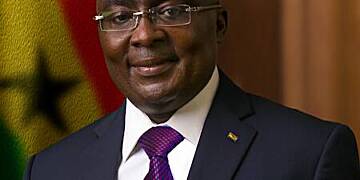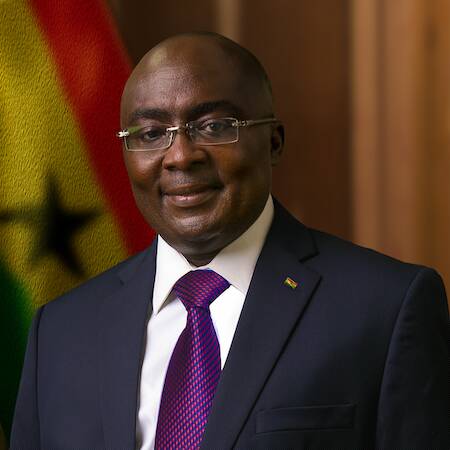In a charged atmosphere of nostalgia, gratitude, and quiet reckoning, delegates of the New Patriotic Party (NPP) gathered at the University of Ghana Sports Stadium to hold their annual delegates conference. The event gave delegates the chance to offer a ceremonial send-off to Dr. Bawumia and a moment to reflect on what many consider a bruising chapter in the party’s history.
Dr. Bawumia, flanked by party stalwarts and greeted with chants and applause, delivered a message that was both sobering and hopeful. He acknowledged the pain of electoral defeat, urged unity, and called for discipline and introspection. “Stop the internal attacks now,” he repeated, warning that tribalism and religious bigotry posed existential threats to the party’s future.
Yet behind the applause lingered an unresolved paradox: While Bawumia may be preparing another run, it remains painfully difficult to convince ordinary Ghanaians that he was not integrally involved in the economic management decisions that unraveled their livelihoods. That, more than any campaign slogan, is the mountain the NPP must now climb.
*Election 2024: A Brutal Verdict*
The 2024 general elections delivered a sobering wake-up call for the NPP:
– Presidential Results: John Mahama of the NDC won decisively with 56.55%, while Dr. Bawumia trailed at 41.61%.
– Parliamentary Results: The NDC secured 188 out of 276 seats, commanding a two-thirds majority. The NPP’s haul of 87 seats marked a steep fall from 137 in 2020. Interestingly the Presidential candidate won in only 77 of these 87 seats.
– Voter Apathy: More than 2 million voters who had backed the NPP in 2020 stayed home—an ominous signal of disengagement and disillusionment.
– Regional Declines: Even in bedrock strongholds like Ashanti and Eastern, support slipped significantly.
This wasn’t simply an electoral defeat—it was a rejection of a governing philosophy that many felt had lost its moral compass. The pain of inflation, unemployment, and currency instability was not theoretical. Ghanaians lived it. And Bawumia’s association with the Economic Management Team as its head—however framed—makes it politically untenable to claim clean hands.
A Fork in the Road: Choosing a New Path
With the NPP presidential primaries slated for January 31, 2026, the party stands at a critical inflection point. Three contenders, beyond Bawumia, are seen as potential agents of renewal:
Kennedy Agyapong has a populist appeal, strong grassroots support, but has a confrontational style and polarizing rhetoric that traditional party folks don’t want Bryan Acheampong brings ln board an entrepreneurial acumen, strategic thinking with a strong Eastern Region base . Yet he has limited national visibility and needs broader coalition
Yaw Osei Adutwum has technocratic credibility and a calm leadership style . But he needs to build grassroots momentum
More than numbers, this moment demands philosophical clarity. What does the NPP stand for—and who is best positioned to renew its covenant with the people?
The Case for Change
The party must confront uncomfortable realities:
– Dr. Bawumia’s proximity to Ghana’s economic challenges makes his political rehabilitation a near-impossible task. His technocratic profile, once hailed, is now tethered to an administration many blame for hardship and broken promises. Regardless of spin, the optics of asking Ghanaians to trust the same hand that stirred the pot may prove unrecoverable.
– The party’s messaging in 2024 failed to resonate emotionally and missed opportunities to inspire hope among youth and informal sector voters.
– Internal fragmentation and elitist posturing alienated the grassroots, leaving many feeling abandoned.
To reposition the party for relevance and impact, it must:
1. Restore trust through humility, empathy, and ground-level engagement.
2. Recraft a vision centered on economic fairness, anti-corruption, and shared prosperity.
3. Elevate a flagbearer whose leadership inspires belief, not just loyalty—someone free from the baggage of past governance errors.
*Conclusion: A Time to Choose*
As delegates bid farewell to Dr. Bawumia, they bid farewell to more than a candidate—they confront the fading aura of a strategy that no longer connects. The next few months will challenge the NPP not merely to choose a new leader, but to redefine its soul.
Whether it’s the strategic acumen of Bryan Acheampong , the
fiery conviction of Kennedy Agyapong, or the calm reformism of Adutwum, the choice must be about moral clarity and national reconnection. The electorate has spoken. The message isn’t just about defeat—it’s about disappointment.
If the NPP is to rise again, it must first reset. Not just in name, but in narrative.




















